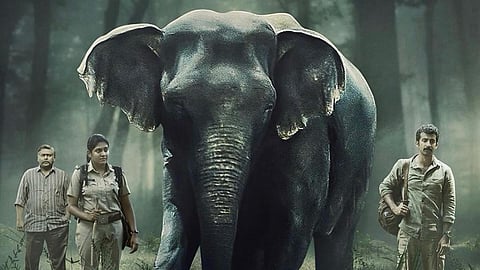Poacher review: Nimisha-Roshan pull off a compelling take on wildlife crimes
Poacher (Malayalam)(3.5 / 5)
In a particular scene in Poacher, a character asks forest division officer Mala Jogi (Nimisha Sajayan) if she has ever seen elephants in the wild – no chains, no human contact, just magnificent giants walking about in the safety of their habitat. She replies that they do not wish to be seen by us and that every time we see them, it is a disaster. This exchange aptly encapsulates the guiding conscience of the eight-part Malayalam wildlife crime drama series streaming on Amazon Prime Video from February 23.
Created by Richie Mehta who made the first season of the acclaimed police procedural web series Delhi Crime (2019), Poacher is a different kind of procedural that follows a group of forest range officers and good samaritans in Kerala who uncover one of the largest ivory poaching rackets in the country. The reason this procedural is different is because it deals with elephant poaching, a crime not generally considered as shocking as other organised crimes like trafficking, drug peddling, or arms dealing, simply because it does not directly affect human beings. We do not see the blood, gore, or helpless suffering of the animal, and hence, poachers are considered less menacing in the category of criminals.
For instance, in the second episode, a small-time ivory dealer tells a female police officer (Kani Kusruti) that they are footmen who do not directly harm elephants, but make handicrafts out of the raw ivory that reaches them, for a living. Putting the intensity of the crime in perspective, she replies that ivory comes from the tusks of elephants that are hacked, tortured, and left to die in the forest, a crime nothing short of barbaric.
This is perhaps the most winning aspect of Poacher — it puts us in confrontation with our entitlement and lack of empathy when violence does not directly affect us. “This is their punishment for being on the same planet as us,” says a character about elephants owned and held captive by powerful individuals and religious trusts, ruffling whose feathers may be a bad idea for investigators.
But there is also a flip side to this. In a scene, Mala explains how elephants are the engineers of the forest, without whom the air quality in Kerala would severely deteriorate, making it akin to Delhi. In response, a man she has just arrested asks her to try telling the same to his child who is starving because their paddy was destroyed by rogue elephants. Poacher briefly discusses how complicated this man-animal conflict is, though the main focus remains anchored on curbing wildlife crimes.
In a recent interview, director Richie Mehta mentioned that he wrote the series based on true events from 2015 and that wildlife crime fighters are among the most noble individuals he has ever met. Nimisha Sajayan’s Mala Jogi reflects this nobility; the actor handles the role well, switching from strong to soft, as she also battles the subtle and sometimes not-so-subtle pressures of being a woman in a male-dominated profession. It helps greatly that we are slowly breaking away from sexualising the female police officer on screen. Like Vidya Balan’s Vidya Vincent in Sherni (2021), Mala wears comfortable, functional clothes, and is not shot in a way that makes her an object of curiosity. But despite Nimisha’s best efforts, in some scenes, one does wish for an actor with more experience in the craft to add a certain loftiness to the character.
Roshan Mathew, who does an impressive job as Alan, a computer programmer, exudes a sense of warmth that ties together the urgency of the task at hand with the nobility of the cause. Dibyendu Bhattacharya as the restrained Officer Neel Banerjee is a treat to watch as he navigates the biggest and perhaps final case of his life alongside personal conflicts. Kani Kusruti too makes her mark, though she suffers from being typecast in roles of women hailing from rural backgrounds.
Poacher is shot by cinematographer Johan Heurlin Aidt, who also shot Delhi Crime, as well as other prominent web series like Leila and The Responder. He ensures that there is an atmospheric quality to the storytelling, and is backed up well by editors Beverley Mills, Susan Shipton, and Justin Li, and composer Andrew Lockington.
In terms of the narrative format though, the series follows the tried-and-tested formula most crime dramas use — a personally conflicted investigating officer uncovering something big. This is often done to bring out different layers of a character, but it gets a bit tiring especially when such formulaic construction of scenes is overused. Sometimes, people simply do their jobs because they care, not because they are necessarily tied to it through personal trauma.
But what really makes Poacher compelling is its intent. In a promotional trailer of the series, executive producer Alia Bhatt is seen mourning the slaughter of a young elephant saying that a crime does not become less significant simply because the victim wasn’t one of us. All episodes open with a horrific crime scene, progressively documenting what happens to the abandoned carcass of a giant tusker. Monkeys, peacocks, owls, squirrels, and many other animals (all tastefully created using CGI) appear on screen as spectators of the protagonists, emphasising that nature belongs to everyone. For trying to bring our collective focus back to coexistence from conquest, Poacher deserves to be watched.
Disclaimer: This review was not paid for or commissioned by anyone associated with the film. Neither TNM nor any of its reviewers have any sort of business relationship with the film’s producers or any other members of its cast and crew.

